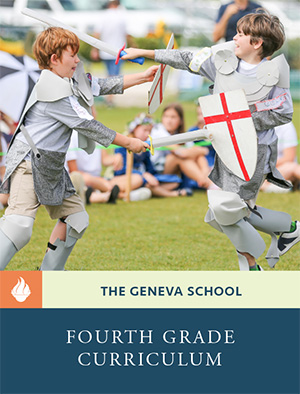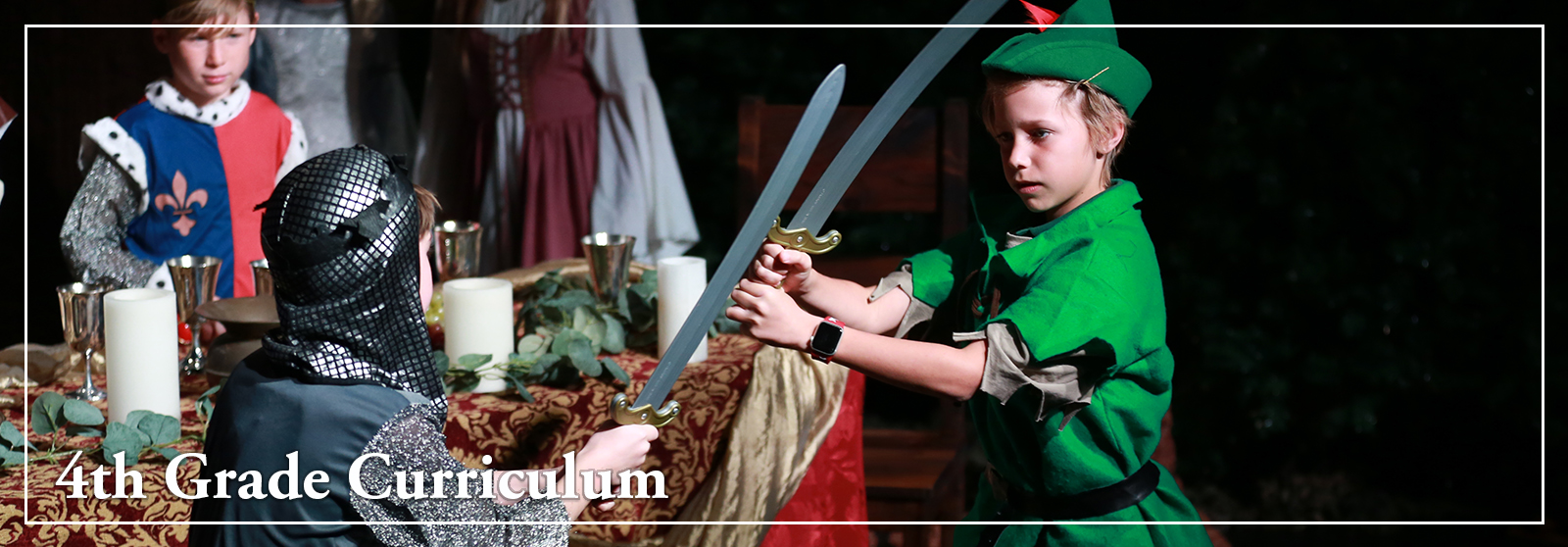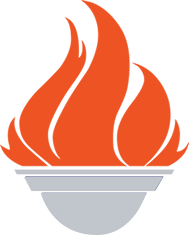4th Grade Curriculum

Fourth grade at The Geneva School is a living fairy tale. As students study the Middle Ages with knights, damsels, castles, and dragons, they are drawn into the living story around them. Students read about King Arthur and the knights of his Round Table, Robin Hood stealing from the rich to give to the poor, and Beowulf defeating multiple monsters and sacrificing his life for his people. As they learn about invading Vikings and the need for protection and chivalry during the Middle Ages, they create their own coats of arms, dress in costumes of the era, witness a real-life joust, compete in a tournament of their own, and recite the code of chivalry. At the end of the year, they are knighted in front of their families and friends. All of these experiences combine to transport students into an enchanted fairy tale world that brings light and excitement to their learning and creates memories that last a lifetime.
History
(AD 376–1563)
History is taught chronologically and encompasses a combination of church history and the history of Western civilization. During this time period, the church began as a thriving institution, suffered major corruption, and was brought back to the Truth by God’s grace through the faithfulness of bold reformers. Students follow the church through history as they study each major emperor and his impact on the Middle Ages. The students watch Europe transform from scattered villages to developed nations as countries battle each other and create alliances. Studying church history along with the developing nationalism in Europe allows the students to see God’s mighty hand at work during the Dark Ages. With an emphasis on chivalry and honor, students learn to fight for what is good, true, and beautiful.
Language Arts
Spelling, Grammar, and Penmanship
Fourth grade students enjoy beginning the year by practicing their cursive penmanship. They then begin to write solely in cursive, honing and displaying their penmanship throughout the year. Spelling instruction is phonics-based and follows the Orton-Gillingham approach. Phonemes and spelling rules are taught explicitly in a structured and sequential manner. Fourth graders venture into the world of affixes. In addition to applying spelling rules, they learn how a prefix or suffix can change the meaning of a word. The program is cumulative, helping students to strengthen previously learned skills as they learn to work with new letter combinations and rules. Further, the students memorize rules of grammar using the Shurley Grammar curriculum. They then apply what they have learned, delighting in the cleverly crafted writing of our literature selections.
Literature and Composition
Using classic literature as a model for good writing, fourth graders begin to craft beautiful stories with descriptive language, incorporating the concepts they are learning in their grammar and spelling studies. Using the Writing and Rhetoric curriculum, teachers lead students through the exercise of analyzing an original model, and then students both summarize and amplify that model. To create excitement and to nurture a love of learning through books, teachers and students dive into such books as The Twenty-One Balloons, The Voyage of the Dawn Treader, Prince Caspian, and The Adventures of Robin Hood. The main method students utilize to assimilate the text that they read is the classical practice of oral narration. Students also transfer their oral narrations to written narrations on a regular basis. This practice is foundational in strengthening the students’ abilities in reading comprehension, writing, and rhetoric. The students gather on the carpet for a special read-aloud time each day. Teachers delight in building wonder and enlarging the imaginations of their students through the expressive reading of Beowulf and King Arthur and His Knights of the Round Table.
Library Science
Library class for fourth graders places an emphasis on the use of the automated catalog. Each student has access to his/her own library account and to the library catalog via the internet. They are taught how to search for titles, how to place holds on titles, and how to evaluate a book by writing reviews. They are taught to identify important information from the catalog records. The students are also exposed to the different genres of literature, taught to use the Dewey Decimal System, and given more opportunities to use various reference materials.
Mathematics
Fourth grade uses think!Mathematics. This curriculum emphasizes problem-solving as the gateway to math understanding and proficiency. Concepts are taught with a concrete-pictorial-abstract learning progression through real-world, hands-on experiences. The curriculum makes these concepts extremely applicable to students by featuring visual representations and modeling strategies to solve complex problems as they are applied to real-world examples. This approach builds upon their understanding of complex concepts and leads to an expanded understanding of place value as well as procedural proficiency. The aim is for students to understand the “how” as well as the “why” in math. Some of the specific concepts taught this year are long division, multiple-digit multiplication, fractions, data analysis, angles, area and perimeter, and decimals through concrete visual examples rather than algorithms alone.
Bible
In fourth grade, students study the fall of Israel and Judah. They study all of the prophets chronologically through the year, and they witness the rebellion of God’s people, the punishment of their captivity, and their restoration back to the Promised Land. By studying each prophet and his message to the people of God, the students acknowledge how easy it is for sinful man to fall into repeated sin and how graciously God corrects those he loves. While learning about the prophet Ezekiel, students lie on their sides and eat Ezekiel bread to experience a very small taste of what Ezekiel was called by God to do (lie on his side for 430 days!). The students delight in the story of Jonah. They each illustrate a different portion of the prophet’s story and then arrange the illustrations into a mural displayed for others to enjoy outside their classrooms.
Science
Leonardo’s Workshop
Historically, the world of modern science finds its foundations in the period from the Middle Ages into the time of the Renaissance. It is against this backdrop that the fourth grade students enter into “apprenticeship” in Leonardo’s workshop. Throughout the year, they encounter stories of the great thinkers of the time and are given opportunities to contemplate the same thoughts, gain a sense of the excitement of discovery, and imitate the manner in which each thinker approached his work. Leonardo directed his students to look to nature as the master teacher. Through observation and attention to accuracy, the students conduct a field study of a local watershed and botanical garden and determine the health of the various ecosystems. They make sketches of macro-invertebrates and create models of insects. Upon looking through Leonardo’s sketchbooks, they too study geometric shapes and employ them in engineered structures like towers, bridges, and earthquake-proof buildings. Leonardo was also a master inventor, and so the apprentices accept challenges calling for creative designs. The next great thinker they study, Sir Isaac Newton, invites them to wrestle with defining and describing light and to rigorously examine God’s miraculous design of the eye coupled with the dissection of a sheep’s eye. They continue their studies into the physical nature of the world as they work with Newton’s laws of motion. Additionally, Galileo, Boyle, and Turner take the students into the realms of the heavens, the plant kingdom, and the composition of matter. It is a year of wonder and amazement. Ultimately, may the students discover, as Robert Boyle did, that “the study of creation should lead to a doxology of praise to God.”
Foreign Language
Students learn Latin through hearing and reading stories, translating from Latin to English and from English to Latin, and by responding orally to questions in Latin. Students also learn Latin by chanting grammatical elements including the first and second noun declensions and the present tense of verbs as well as comparing and contrasting the structure of Latin to their knowledge of English grammar. Several prayers, including The Lord’s Prayer, are memorized in Latin over the course of the year, helping connect students’ growing understanding of the language to the ancient roots of the Christian faith.
Music
In every grade at The Geneva School, music study and performance are vital to developing an aesthetically rich liberal arts education. Fourth grade is an especially exciting year for music study at Geneva since vocal and instrumental music played such an important role in the Middle Ages and Renaissance. Students sing medieval songs and chants, canons, partner songs, folk songs, hymns, and spiritual songs. By studying the music, composers, and instruments of the medieval period, students learn about the role of music in history, which further develops their understanding of the role that music plays in our school and the Bible.
All fourth grade students learn how to play the soprano recorder. The recorder was one of the primary instruments in the Middle Ages, introduced in the 1500s. Through group and self-paced lessons, students use their music reading skills to practice correct fingering, good breath control, and proper tone quality.
Fourth grade students build upon the musical foundation of previous years, further deepening their understanding of the elements of music. Texture and tonality are introduced as students use their developing musicianship skills to notate melodic and rhythmic patterns using the Kodaly method. Fourth grade students also play Orff instrumentation to enhance their auditory skills and eye-hand coordination and learn to work together as an ensemble.
Music performances include Lessons and Carols, the spring concert, and the Knighting Ceremony.
Art
Fourth grade students spend the year expanding their understanding of the vocabulary of visual art and gaining exposure to the art and lives of accomplished artists. It is important to develop visual literacy in order to look at and see art as it was meant to be seen by its maker; this conversation engages students in what is considered the “grammar” of art—the elements and principles of design. Students transition from imaginative, symbolic drawing to representational drawing and painting through exercises emphasizing three-dimensional form and volume. Using a variety of media (e.g., colored pencils and tempera paint) and the art forms of the Middle Ages, the Renaissance, and the Reformation, students grow in their understanding of color, including value changes in color and black/white works. For example, students practice shading and shadows. They are also introduced to the elements of art using the principles of design (harmony, variety, contrast, etc.) as tools in successfully creating their own work.
Drama
The Geneva School drama program not only seeks to enrich a student’s learning through the experience of history and literature but also seeks to build character through the rehearsal and production process. Students are given responsibilities appropriate to their developmental level and are encouraged to problem-solve and work together as a group to tell their story.
In fourth grade, students delight in reading about Robin Hood’s adventures in Roger Lancelyn Green’s classic story of social justice and outrageous cunning, The Adventures of Robin Hood. They then have an opportunity to bring one of these adventures, filled with Robin Hood’s merry men and his beloved Maid Marian, to life! Fourth grade students memorize and expertly deliver clever lines while also learning how to block scenes with quite a bit of action, including a few choreographed sword-fighting scenes! Complete with beautiful costumes and set pieces, the production is a fan favorite as the audience marvels at the fourth graders’ abilities to immerse themselves in their characters and perform in a way that would delight even knights and ladies!
Physical Education
The Geneva School is committed to providing a curriculum in physical education that allows frequent and diverse opportunities to engage in physical activities necessary to support a healthy mind and body. Fourth grade students develop specific sports skills through learning, practice drills, and modified game play. Students learn the basic rules of a variety of sports and games and build health and fitness through strength and flexibility conditioning with an emphasis on cardiovascular endurance. Fourth graders develop motor proficiency through expressive play and creative movement. Students enjoy individual sports such as tennis and track as well as team sports such as volleyball, Wiffle ball, and basketball.
Field Trips and Culminating Events
Field Trips
- Medieval Times: Students reflect upon their studies of the Middle Ages as they tour a medieval village complete with artifacts, pictures, and historical specialists. Students then enjoy an educational presentation on medieval weapons and falconry and are entertained by a live joust during a traditional feast.
- Cathedral Tour: After studying medieval architecture, the fourth grade embarks on a tour of churches in downtown Orlando. They enjoy an architectural scavenger hunt and are instructed by several knowledgeable tour guides as they visit the Cathedral Church of St. Luke, St. James Catholic Cathedral, and St. George Antiochian Orthodox Church.
- Mead Botanical Garden: Students investigate Mead Botanical Garden under the direction of an expert botanist and a waterway conservationist. They experience an edible plant walk, a pond investigation, and a stream exploration.
Culminating Events
- Monastery Day: Students spend the day praying and working in silence as they seek to experience what life was like in a medieval monastery. Students enjoy working in the school garden, preparing the day’s meal, serving others, and performing various other tasks around the school.
- Viking Day: Students experience life as Vikings as they create projects, enjoy a meat-centered feast, play Viking games, and hear Viking stories.
- Printing Press: Johannes Gutenberg introduced printing to Europe in 1439 when he invented the printing press. For the first time, the Bible became accessible to everyone. Students learn about this world-changing invention and practice printmaking modeled after the technique used by Gutenberg.
- The Advetures of Robin Hood Play: After students read Roger Lancelyn Green’s The Adventures of Robin Hood, they recreate and perform some of Robin Hood’s adventures in Sherwood Forest with his band of merry men and the lovely Maid Marian.
- Knighting Ceremony: After months of studying the Middle Ages and progressing through the stages of knighthood, students participate in a squires tournament, medieval sword dance, Maypole dance, knighting ceremony, and scrumptious feast. Parents and loved ones are encouraged to attend this spectacular event. The Knighting Ceremony is the crowning glory of the fourth grade experience.


